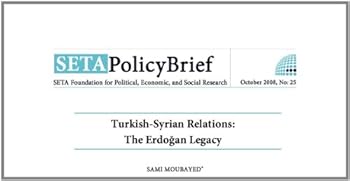

The rise to power of Turkish Prime Minister Tayyip Erdoğan marks a new era in positive Turkish-Syrian relations. The new Syrian attitude towards Turkey represents a break from past: Syria considers Turkey a reliable partner for brokering a peace deal between Syria and Israel, and Turkey offers opportunities for political and economic cooperation for improving the welfare and security of two countries. The Syrian administration considers Turkey’s partnership to be a key factor in its attempts to achieve integration into the international community, a solution of the problems with Israel, and the securing of territorial unity in Iraq.
The Syrians are making a lot of investments in Turkish Prime Minister Recep Tayyip Erdoğan, viewing him as a man who can bring peace to the region and help Syria re-enter the international community. The Syrians are evidently willing to go to great lengths to please the Turkish leader, as they demonstrated by opening channels with the Turkish Republic of Northern Cyprus (TRNC) despite public outcry from Europe and the Greek Cypriots. Syrian students are being encouraged to study at TRNC universities, and a ferryboat line between Famagusta and Lattakia is now operational, bringing life to the divided island, whose only lifeline had been – due to an international boycott – the Turkish Republic itself. Public opinion in Syria is now ripe for a Syrian-Turkish honeymoon, in political as well as economic domains: Syrian tourist companies are actively promoting Turkish destinations like Bodrum and Istanbul, and for the first time ever, powerful Damascene families are setting a trend of holding weddings in Turkey, at times hosting parties for nearly 1,000 people in the hotels and resorts of Istanbul. Turkey is also being promoted as a shopping venue for Syrians, a clear alternative to and replacement for Lebanon, and private Syrian universities are seeking exchange programs with Turkish institutes. Turkish TV dramas, dubbed into Arabic, enjoyed a tremendous success in Syria in 2008, even rivaling the highly-publicized Syrian series famous throughout the Arab world. For the first time ever, posters of Turkish actors and actresses are being pinned on the bedroom walls of Syrian teenagers. Syrian censors are making it clear to artists, directors, and scriptwriters that any work promoting animosity towards the Ottoman Empire (much welcomed in the 1990s) will not be shown on Syrian TV. Historians from both countries are even toying with the idea of re-visiting the Ottoman Era to shed light on the reforms and positive sides of Syrian-Turkish history. Previously, generations have been raised knowing very little about the relationship, apart from the years 1908-1918, which witnessed the famous executions of Arab nationalists in Damascus, carried out by Jamal Pasha, the military governor of Ottoman Syria, during World War I.
Historical Background
Relations between both countries were never warm after the collapse of the Ottoman Empire in 1918. The early years of Arab nationalism fanned anti-Turkish sentiment throughout Syria at a time when the Syrian Republic was young and needed to break with its immediate, yet very long and dominant, Ottoman past. The loss of the Sanjak of Alexandretta to Turkey in 1939 – a deal brokered by none other than the French government – only added insult to injury, making the relationship appear irreparable. Although the Syrians continued to live in Ottoman-built buildings, work with Ottoman laws, and enjoy Ottoman cuisine, culture, and language, they had become increasingly anti-Turkish by the mid- 1950s. The rift solidified further when Syria sided with the Eastern bloc, while Turkey allied with the United States and became a member of NATO. Under the regimes of presidents Shukri al-Quwatli and Jalal Bayar, both countries worked vigorously against each other...
DOWNLOAD TURKISH-SYRIAN RELATIONS: THE ERDO?AN LEGACY (SETA POLICY BRIEFS) - SAMI MOUBAYED
No comments:
Post a Comment